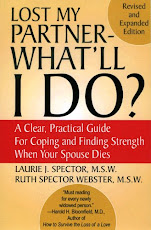
Sleeping
In our last post, we looked at ways to cope with the appetite loss that’s a common symptom of grief.
Here we revisit our best advice on getting through those nights when sleep is a problem.
Sleeping Solo
Some people find it difficult adjusting to sleeping alone after his or her partner has died.
It’s often uncomfortable to change your position in the bed after having shared it with a partner. For some, moving into a bedmate’s “space” may feel comforting while for others it’s a painful acknowledgment that a loved one is no longer there.
Whether you feel most comfortable sleeping on your usual side of the bed or moving to your late partner’s side, here are some tips for helping you adjust to sleeping alone:
1) Try hugging a pillow to help you doze off.
2) You may want to sleep with an article of clothing that carries your partner’s familiar scent.
3) If you’re uncomfortable moving from your customary position, “try out” shifting yourself gradually toward the center of the bed.
4) If you initially find it comforting to have your young child/children sleep with you, try to ease them back into their own beds as soon as possible. While it may be reassuring to you and your child in the short term, you don’t want to burden children with the responsibility of “taking care” of you.
5) Sharing the bed with your pets, however, is a better way to feel less alone.
Adjusting to sleeping by yourself is a very personal process. There is no right or wrong about this, so take your time and move (or sleep) at your own pace.
How to Ease Into Those ZZZs; Part 1
Since your spouse/partner’s death, do you feel exhausted during the day because when you try sleep at night, you:
a) Toss and turn all night, unable shut down your thoughts?
b) Fall asleep, only to wake up a few hours later, unable to get back to sleep?
With all the mental and physical overload caused by your spouse/partner’s death, it’s no wonder your normal sleep habits have been affected.
If so, keep in mind that some disturbances in your normal sleep pattern should be expected. With all the changes and stresses you’re dealing with, it’s no wonder you can’t rest.
With time, these typical symptoms of grief will subside.
In the meantime, remind yourself that everything seems worse at night. Once morning arrives, the problem or memory that kept you tossing will probably seem more manageable.
How to Ease Into Those ZZZs; Part 2
Now for the 7 most useful tips on dealing with that long stretch before your alarm goes off.
1) Use your bed for sleep only. If you have get up, go into another room to read or watch something boring on TV. Avoid the mental stimulation of using a computer.
2) Don’t look at the clock. Noticing how long it’s taking you to fall asleep can become another pressure.
3) If you’re too tense to fall asleep, get up and perform some repetitive housework, like vacuuming...(
read more)






